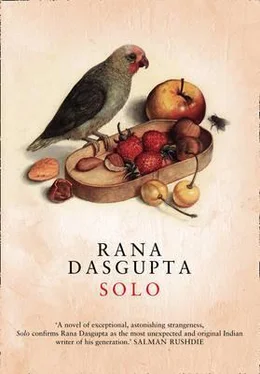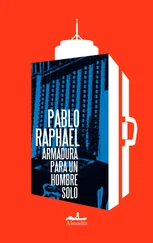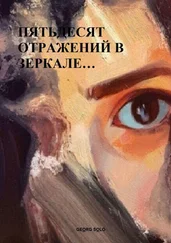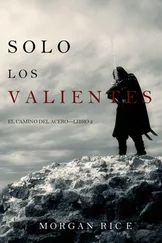‘Do you remember me?’
‘Of course I remember. But it’s three o’clock in the morning!’
‘You told me to call you if I was ever coming to New York.’
‘Right.’
‘I’m coming and I need a job.’
‘Right.’
‘And I need you to wire me five thousand dollars today.’
‘You want me to wire you five thousand dollars!’
‘Yes. I’m in Vienna at the Holiday Inn.’
‘I see.’ He paused. ‘I’ll see what I can do.’
‘Thank you.’
Irakli was watching her gravely. As she put down the phone, he said,
‘I don’t think I know who you really are.’
The money arrived that afternoon, and Khatuna bought tickets to New York.
Charles met them at the airport, and was dismayed to discover he was taking charge not only of Khatuna but also of her dishevelled younger brother.
From the taxi, Irakli looked up at the skyscrapers, which were old and scaled like a prehistoric fish. Ichthyosaur , he thought.
The three of them went out to dinner. Irakli said nothing to Charles all evening, and Khatuna drank two bottles of wine. Charles thought, All along, she was just a Third World girl. Give them an inch, they take a mile .
Afterwards he took her home and fucked her while Irakli, on the couch outside, piled the pillows round his head.
Khatuna had only just stopped bleeding from her miscarriage. But her screams came less from Charles’ fucking, than from its insufficiency.
12
THERE IS AN INCANDESCENT GAP between the buildings, and Ulrich realises he is close to Times Square. He wears a maroon tie and a blazer beneath his overcoat, which give him a distinguished air, even if they hang a little loose on his elderly frame. He wanders towards the light.
In his daydreams, Ulrich is somewhat altered from real life. The gold watch he was forced to sell glints once more on his wrist, and his blind eyes are seeing and undimmed. He stands more upright, and that pleading air, which he has always detested in himself, is gone — as if he had not spent his time dwelling on what was taken away. He walks naturally, like the other people on the street, as if there were no reason he should not be here. He resembles one of those men, perhaps, who has just emerged from a theatre — for it is night — or from a jazz club, and who wanders, satisfied with what he has seen.
He comes in under the marvellous light, and stops to watch. Dazzling screens wrap polyp towers, which spire against the orange sky. His white hair reflects the logos, and turns harlequin.
His attention is captured by the familiar features of Albert Einstein playing on a vast video display. Einstein’s face is the size of a large house and it lights up the damp ground. The screen dims, and text appears: The highest form of musicality in the sphere of thought — and Ulrich smiles possessively, for these are words he had once written on his wall: Einstein’s opinion of Niels Bohr’s theory of atomic structure. The text dissolves and converts to plasma. The advertisement ends with the logo of a mobile phone company.
It is late and he grows tired. He looks around to orient himself, and sets off into the dark streets. The wind is cool and he puts his hands in his pockets, which are heavy with marbles.
Boris’s signature on the contract is a work of art. Still, the lawyer asks him to do it again.
‘In English please. Our people can’t read Cyrillic.’
The document is forty-five pages long, and there are three copies. Boris has to initial every page. Hereinafter called ‘the Artist’ . He is bemused by their heavy-handed ways.
The CEO of Universal Music has stepped into the room to give the moment some razzle-dazzle.
‘We’re really excited to have you on board,’ he says, shaking Boris by the hand. ‘You’re a great musician, and you’ve come to the right place. You’ll see what we do here when we pull out all the stops.’
Boris nods appreciatively.
It is eleven in the morning, and the ceremony does not last long. People turn away to discuss work, even over champagne.
The CEO is left one-on-one with Boris.
‘I want you to think of this place as your home. Universal is like your family, and the only thing we care about is helping you make great music.’
Boris does not reply. The CEO says,
‘It’s nice to get a bit of good news from Bulgaria. All I usually get from that part of the world is piracy. I guess you must have seen it on the streets.’
He shudders. He looks at his watch and says,
‘It’s an uphill battle. Consumers don’t pay for music any more because they think it’s free. They don’t respect the work we do, you and me.’
Plastic comes and puts an arm round Boris’s shoulders.
‘I need to steal this man away,’ he says to the CEO.
‘I’ve been telling him about piracy,’ says the CEO. ‘But you have nothing to worry about, Boris. You’re with the biggest music company in the world. You have a lot of muscle on your side.’
‘I’m taking him to buy a new violin,’ says Plastic. ‘Look at that old thing he uses.’
Boris is holding the violin that Slavo gave him, years ago. It’s somewhat knocked on the corners, and the varnish is dulled, but he doesn’t understand why these men look at it with such derision. It has new strings, and the sound is good.
Plastic makes a quick exit with Universal’s new star, and they get into his limousine, which is waiting outside the building.
By now, Boris has been in New York for a while. He has settled down with a small group of musicians: a piano player, a bandoneon player and a DJ. He is writing a lot of music.
Boris is staying in a company apartment, but he also has the keys to Plastic’s home. Plastic wants every kind of resource to be available to Boris while he composes. There is a full-time butler in his apartment who takes care of meals, and it has a soundproofed music room with a miraculous stereo system. Boris spends many days there, working through Plastic’s enormous record collection. He has taken to writing music at his Blüthner piano.
When he wants to think about other things, he sits in Plastic’s living room. He reads his books and watches his TV.
Today, Plastic is in a rush to buy the violin. The driver takes them to the violin dealer’s studio, which is open to a little courtyard, and invisible from the street. Mr Stern, the owner, has half-moon glasses hanging on a string of coloured beads around his neck, and is standing outside plucking a pomegranate from one of the trees in the courtyard. He is expecting Plastic, and leads them inside.
Boris gasps at the riches held there, and Mr Stern shows him violins from every place and time. He can recite the list of owners over centuries, though the names mean little to Boris. He has a lute and a viola da gamba, and curiosity instruments with ten strings.
He has made a shortlist for Boris, who begins to try them out. With each trial, Mr Stern identifies the precise cause of his dissatisfaction and offers him another instrument, nearer to perfection.
The ageing Mr Stern eyes Plastic as Boris frowns over each violin. His look says, Who is this boy?
Boris is absorbed by the sounds he is making with these instruments. He is already at work, testing ideas. It is impressive to see how he thinks, but Plastic is due to give a speech at a charity lunch, and he cannot stay long. Two violins are lying on the counter, and he pushes Boris towards a decision. Boris plays the same phrase on each, and Mr Stern smiles.
‘Now it’s obvious,’ he says, and he laughs delightedly when Boris indicates his choice. He picks up the violin himself, and caresses it.
Читать дальше
Конец ознакомительного отрывка
Купить книгу












